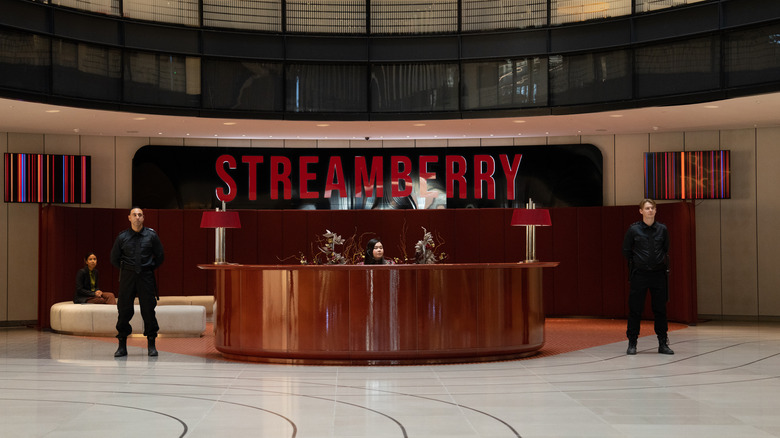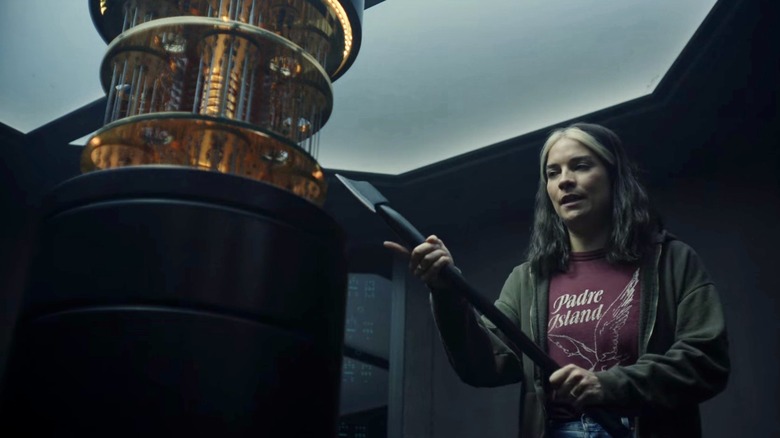In Black Mirror Season 6, Real Life Tech Horrors Have Finally Caught Up With The Show
This post contains spoilers for "Black Mirror," season 6, episode 1.
For over a decade, "Black Mirror" has been "The Twilight Zone" of technology, a show where the dystopian future never feels far off. Like most anthologies, "Black Mirror" season 6 is a mixed bag, but as it progresses, it becomes an outright genre-buster, straying from science fiction into true crime and several horror sub-genres.
In some ways, what started out on Netflix as an imported British series has long since gone Hollywood and become more about celebrity than technology. With episodes set in 1969, 1979, and 2006 (the year Katie Holmes and Tom Cruise's daughter, Suri, was born), this is a backward-looking "Black Mirror."
By introducing its own meta version of Netflix, "Streamberry," and filling it with in-universe titles related to previous "Black Mirror" stories (Will Poulter's face signals "Finding Ritman" as a callback to the interactive film, "Black Mirror: Bandersnatch"), the season 6 premiere, "Joan Is Awful," offers one possible explanation for this retreat into the past. After the premiere, some or all of what we see the rest of the reason — beginning with the next episode, "Loch Henry" — could simply be content that characters like Joan (Annie Murphy) would watch on Streamberry.
That's not to say "Black Mirror" has totally lost its identity as a series about the dangers of current and future technology. While uneven in its celebrities-playing-themselves conceit (in an "Ocean's Twelve" kind of way), "Joan Is Awful" nonetheless feels ripped from the headlines of 2023. It's an episode that shows how the tech horrors of the present have caught up with "Black Mirror," reminding the audience that the cracked, screen-based culture it inhabits has become a real-world episode of the very show it's watching.
Welcome to Sonicle
Right off the bat, the "Black Mirror" season 6 premiere feels on point for 2023, as Joan, the middle manager for a tech company named Sonicle (almost an anagram for Silicon) talks algorithms with an employee and is forced to lay her off at the expense of eco-friendly business pledges.
Just this week, there was a Bloomberg article about how the deluge of 2023 tech layoffs has ended "the myth of infinite Silicon Valley jobs." The next day, Axios reported that a record number of media jobs have been cut in the first half of 2023, even more than in 2020 when the pandemic broke out. This is something that has affected /Film as much as any other news site.
One thing reportedly driving the media layoffs is a decrease in ad revenue. Back in February, we explored how the "Black Mirror" season 1 episode, "Fifteen Million Merits," starring Daniel Kaluuya, foresaw the unskippable junk ads that have plagued sites like YouTube of late. There's more than one Easter egg for that episode here, as we see a glimpse of the reality show "HotShot" on Streamberry and hear "Anyone Who Knows What Love Is (Will Understand)" playing in the background when Joan goes to meet her ex-boyfriend in a restaurant.
The same overall revenue decrease has allowed more YouTube and streaming ads to sneak in and shave precious seconds (or "merits") off your life every time you sit through them. The alternative is to pay the ad-free upcharge, "pay" being the operative word at work in the machinery of tech-enabled capitalism. As Joan explains to the employee she's letting go, the Sonicle board cares less about carbon footprints and the company's environmental initiatives and more about the bottom line. It's out to make money, plain and simple.
Joan Is Awful: A Streamberry Original
In 2023, you have to wonder if the Sonicles of the world are really losing enough money to necessitate unending waves of layoffs, or if they've simply been operating on an unsustainable growth model and are no longer making as much money as they would like. (Regarding that ravenous growth model, maybe series creator Charlie Booker should have used Muse's "Supermassive Black Hole" as the soundtrack for this episode instead of episode 4?)
With Netflix, at least, we know the answer to the money question. At the outset of the streaming 2020s, Forbes argued that "Netflix's business model does not work," as it was burning too much cash and barely breaking even at the time. Fast forward to January 2022, when the company couldn't hit its projected subscriber numbers and dropped $50 billion in value overnight. Things got worse a few months later when its first quarterly report of 2022 prompted shareholders to sell off stocks, leading to déjà vu headlines about Netflix losing $54 billion overnight.
What's scary for our protagonist in "Joan the Awful" is that she herself becomes a victim of the same system that chews people up and spits them out at her company. And it's all because she didn't read the fine print in an absurdly long agreement that she had to sign when she joined Streamberry as a subscriber. The average person clicks past agreements like this all the time; who has time to scroll through and read the whole thing when the need for instant streaming gratification is so strong?
Unfortunately for Joan, it's an airtight legal document in this case, giving Streamberry the right to turn her life into disposable content for its platform.
Joan and the Salma: Quamputer-mania
Salma Hayek Pinault, playing herself (or a deepfake), also signs away the rights to her digital likeness in "Joan the Awful," enabling Streamberry to paste her face anywhere, even on a character desecrating a church (which upsets her, as it goes against her Catholic faith). Streamberry R&D's offices notably employ "deepfake casting," of the type you might see in a "Star Wars" show on Disney+ (keeping in mind that Industrial Light & Magic did hire a deepfake expert after that person did a better job of digitally de-aging Luke Skywalker than ILM did.)
In the face of ChatGPT, Microsoft founder Bill Gates wrote on his blog this year, "The Age of AI has begun." Streamberry R&D also has an "AI prompt writers room," which must be the kind of place where they field trendbot pitches. For years, Netflix itself has relied on machine learning algorithms and personal viewing trends to power its recommendation system (via Wired). In a year when Betty Gilpin's nun heroine in "Mrs. Davis" has already fought an all-powerful Algorithm, the AI in "Joan the Awful" takes the form of the Quamputer, "an infinite content creator capable of willing entire multiverses into existence."
Marvel Studios — K.E.V.I.N.! — is that you? Sorry, that was "She-Hulk" and "Quantumania." We're discussing the almighty Quamputer. As its name implies, it can spit out "computer-generated material" of the quantum variety, bypassing months of hard human work and seemingly pulling "fully edited programs" out of a magic hat. Why pay people to work when you can train a machine to do it?
As we see in "Black Mirror," however, the Quamputer and Streamberry merely plagiarize Joan's life, turning her and her fiancée's "Netflix and chill" session into a nightmare where she's reliving her worst moments under public exposure.
An axe to the system
Considering everything we've witnessed, not just with digital de-aging, but with the digital resurrection of dead actors (something you can see in a major movie that just opened this weekend), the sentient deepfakes and legally powerless real people of "Joan Is Awful" feel all too plausible. No wonder there's been talk of a possible Screen Actors Guild strike to accompany the ongoing Writers Guild of America strike in Hollywood.
The advent of AI, coupled with a lack of transparency regarding viewership numbers on the part of streamers like Netflix, are two of the key issues driving the writers' strike. No longer beholden to Nielsen, TV ratings have, as Variety notes, become a "walled garden" that can be hidden in-house.
During the pandemic, when more people were stuck at home, there was a big pivot to streaming and investment in online media — only for a whiplash to occur as people ventured back out again. Since losing billions last year, Netflix has cracked down on password sharing, and it's continued its longtime practice of axing shows after two or three seasons, the way Joan axes the Quamputer in "Black Mirror." As Business Insider observed in 2019, even Netflix's old slate of Marvel shows was not safe from its cancel-happy ways, which may allow it and other streamers to cut costs by reducing the amount of residuals they have to pay writers and showrunners.
Competitors like Warner Bros. Discovery are no better, as we've seen them treating "Batgirl" and other people's creative endeavors as a tax write-off. That's what you get when you trust your fate to the Quamputer. In "Joan the Awful," the scariest thing may just be that real life has completely caught up with "Black Mirror."
"Black Mirror" season 6 is streaming on Streamberry Netflix.




